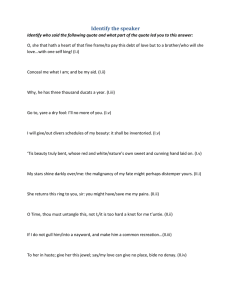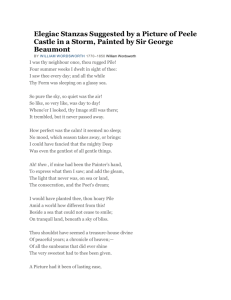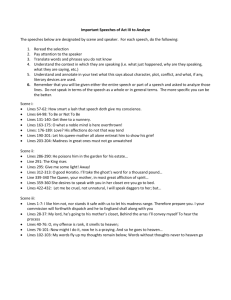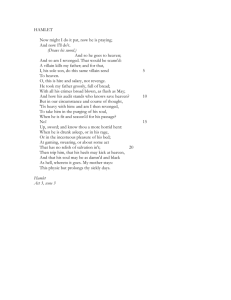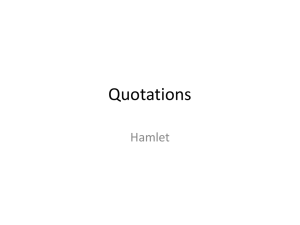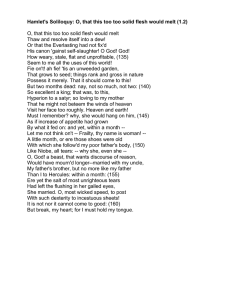hamlet quotations
advertisement
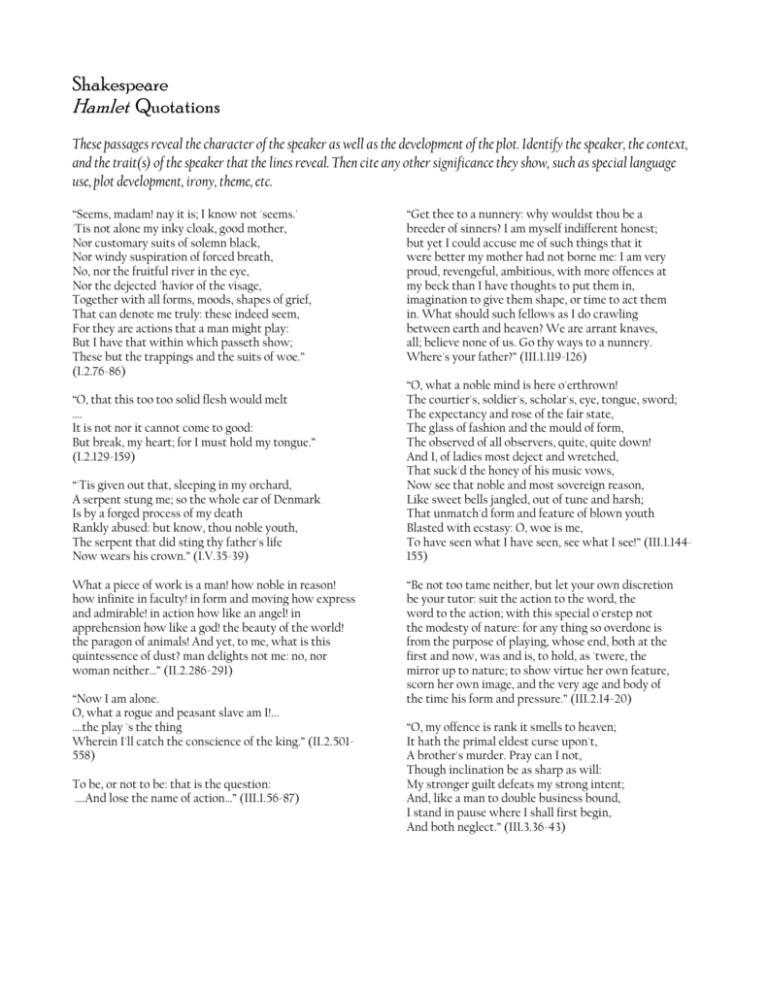
Shakespeare Hamlet Quotations These passages reveal the character of the speaker as well as the development of the plot. Identify the speaker, the context, and the trait(s) of the speaker that the lines reveal. Then cite any other significance they show, such as special language use, plot development, irony, theme, etc. “Seems, madam! nay it is; I know not 'seems.' 'Tis not alone my inky cloak, good mother, Nor customary suits of solemn black, Nor windy suspiration of forced breath, No, nor the fruitful river in the eye, Nor the dejected 'havior of the visage, Together with all forms, moods, shapes of grief, That can denote me truly: these indeed seem, For they are actions that a man might play: But I have that within which passeth show; These but the trappings and the suits of woe.” (I.2.76-86) “O, that this too too solid flesh would melt …. It is not nor it cannot come to good: But break, my heart; for I must hold my tongue.” (I.2.129-159) “'Tis given out that, sleeping in my orchard, A serpent stung me; so the whole ear of Denmark Is by a forged process of my death Rankly abused: but know, thou noble youth, The serpent that did sting thy father's life Now wears his crown.” (I.V.35-39) What a piece of work is a man! how noble in reason! how infinite in faculty! in form and moving how express and admirable! in action how like an angel! in apprehension how like a god! the beauty of the world! the paragon of animals! And yet, to me, what is this quintessence of dust? man delights not me: no, nor woman neither…” (II.2.286-291) “Now I am alone. O, what a rogue and peasant slave am I!... ….the play 's the thing Wherein I'll catch the conscience of the king.” (II.2.501558) To be, or not to be: that is the question: ….And lose the name of action…” (III.1.56-87) “Get thee to a nunnery: why wouldst thou be a breeder of sinners? I am myself indifferent honest; but yet I could accuse me of such things that it were better my mother had not borne me: I am very proud, revengeful, ambitious, with more offences at my beck than I have thoughts to put them in, imagination to give them shape, or time to act them in. What should such fellows as I do crawling between earth and heaven? We are arrant knaves, all; believe none of us. Go thy ways to a nunnery. Where's your father?” (III.1.119-126) “O, what a noble mind is here o'erthrown! The courtier's, soldier's, scholar's, eye, tongue, sword; The expectancy and rose of the fair state, The glass of fashion and the mould of form, The observed of all observers, quite, quite down! And I, of ladies most deject and wretched, That suck'd the honey of his music vows, Now see that noble and most sovereign reason, Like sweet bells jangled, out of tune and harsh; That unmatch'd form and feature of blown youth Blasted with ecstasy: O, woe is me, To have seen what I have seen, see what I see!” (III.1.144155) “Be not too tame neither, but let your own discretion be your tutor: suit the action to the word, the word to the action; with this special o'erstep not the modesty of nature: for any thing so overdone is from the purpose of playing, whose end, both at the first and now, was and is, to hold, as 'twere, the mirror up to nature; to show virtue her own feature, scorn her own image, and the very age and body of the time his form and pressure.” (III.2.14-20) “O, my offence is rank it smells to heaven; It hath the primal eldest curse upon't, A brother's murder. Pray can I not, Though inclination be as sharp as will: My stronger guilt defeats my strong intent; And, like a man to double business bound, I stand in pause where I shall first begin, And both neglect.” (III.3.36-43) “Now might I do it pat, now he is praying; And now I'll do't. And so he goes to heaven; And so am I revenged. That would be scann'd: A villain kills my father; and for that, I, his sole son, do this same villain send To heaven.” (III.3.73-78) “Look here, upon this picture, and on this, The counterfeit presentment of two brothers. See, what a grace was seated on this brow; Hyperion's curls; the front of Jove himself; An eye like Mars, to threaten and command; A station like the herald Mercury New-lighted on a heaven-kissing hill; A combination and a form indeed, Where every god did seem to set his seal, To give the world assurance of a man: This was your husband. Look you now, what follows: Here is your husband; like a mildew'd ear, Blasting his wholesome brother.” (III.4.53-65) “O Hamlet, speak no more: Thou turn'st mine eyes into my very soul; And there I see such black and grained spots As will not leave their tinct.” (III.4.88-91) “I have sent to seek him, and to find the body. How dangerous is it that this man goes loose! Yet must not we put the strong law on him: He's loved of the distracted multitude, Who like not in their judgment, but their eyes; And where tis so, the offender's scourge is weigh'd, But never the offence.” (IV.3.1-7) “How all occasions do inform against me, And spur my dull revenge!... …O, from this time forth, My thoughts be bloody, or be nothing worth!” (IV.4.3266) “O heat, dry up my brains! tears seven times salt, Burn out the sense and virtue of mine eye! By heaven, thy madness shall be paid by weight, Till our scale turn the beam. O rose of May! Dear maid, kind sister, sweet Ophelia! O heavens! is't possible, a young maid's wits Should be as moral as an old man's life?” (IV.5.154-160) “Alas, poor Yorick! I knew him, Horatio: a fellow of infinite jest, of most excellent fancy: he hath borne me on his back a thousand times; and now, how abhorred in my imagination it is! my gorge rims at it. Here hung those lips that I have kissed I know not how oft. Where be your gibes now? Your gambols? your songs? your flashes of merriment, that were wont to set the table on a roar? Not one now, to mock your own grinning? quite chapfallen? Now get you to my lady's chamber, and tell her, let her paint an inch thick, to this favour she must come;” (V.1.156-164) “Not a whit, we defy augury: there's a special providence in the fall of a sparrow. If it be now, 'tis not to come; if it be not to come, it will be now; if it be not now, yet it will come: the readiness is all: since no man has aught of what he leaves, what is't to leave betimes?” (V.2.192-196)

